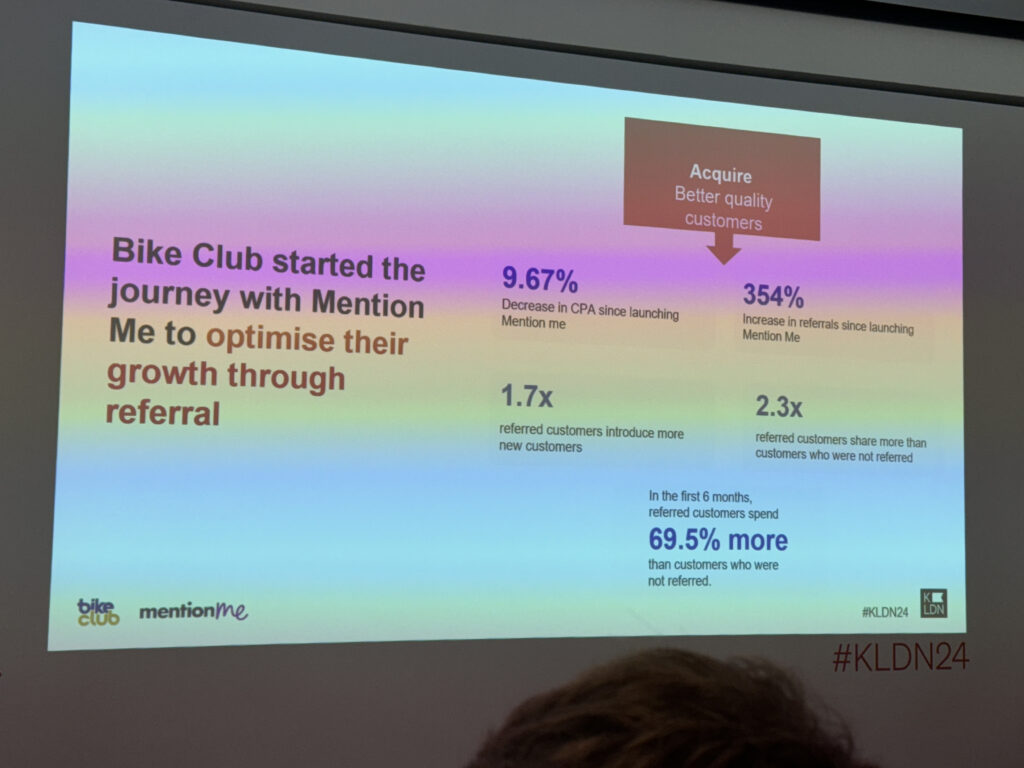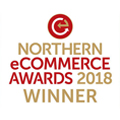Bring Digital’s Partnerships Director Paul Casey shares his top 5 learnings from Klaviyo’s annual K:LDN event, including a peek under the hood at the CRM giant’s upcoming features.
Don’t get me wrong: London is a big place.
But after spending just a few hours at the QEII Centre in Westminster last Tuesday, the capital felt small to me compared with the huge plans that were being shared at Klaviyo’s annual K:LDN event.

For the uninitiated, Klaviyo is one of the world’s biggest marketing automation platforms. It provides integrated email, SMS, mobile push, and personalisation features for more than 143,000 brands in over 80 countries. And as one of their partners, we were invited down to the event to hear about all the things they have planned over the next 12 months.
And boy, there was a lot.
I’ve distilled everything I learned from the event into one, digestible hitlist below of the top 5 things you can take away. And before you say anything: yes, there’s a lot of AI coming. But there’s also a human side to all this; a look to the past of human-centred storytelling as well as to its future.
Perhaps that was why it was 80s themed? I neglected to ask: I was marvelling at the merch.
Anyway.
Unless you’re Steven Spielberg, it’s not every day you get to hear Hollywood’s best behind-the-scenes stories straight from the horse’s mouth.
We were lucky enough to do just that when ex-Warner Brothers executive Jason Bevan took to the K:LDN main stage. For nearly 20 years, Jason worked on some of the biggest films of the 21st century, spanning everything from Harry Potter franchise and The Hobbit to The Lego Movie and Joker.
Jason spoke on the topic of creativity — and his talk was just as compelling as his CV. Weaving in film footage and insider commentary on how each scene was first imagined, he argued that, while the age of AI is very much here in the creative industry, it’s really just a tool. Our true power as human marketers is tapping into and engaging with emotions that all consumers feel. That, he argues, is our greatest asset.

To do that, Jason said, you need to “learn which rules to blow up.” He encouraged us to first identify the ‘train tracks’ of our thoughts; the comfortable well-trodden routes that we revert back to under stress. These ‘tracks’ are the limits on your creativity currently. To get off them requires taking a risk; after all, derailing is rarely fun. But it’s necessary, Jason argued, if you wanted to get the most out of the human superpower that is real creativity.
And if you need a little push? Jason spoke at length about how some of the biggest successes in his career stemmed from the moments where he invited “uninformed geniuses”. Smart people who aren’t experts in your field are peerless at thinking outside the box. They can transform your thinking, identify what triggers your own ideas, and help you embed a culture of creativity into your organisation.
Take that, ChatGPT.
(P.S. I didn’t mean it, ChatGPT. Thanks for helping me write this blog.)
Anyone who has worked in eCommerce for more than a few minutes will have heard the term “segmentation” thrown around plenty, especially over the last five years.
But Claudia Ditri and Rachel Tonner of market-leading search and merchandising tool Klevu brought a fresh perspective to segmentation that made it feel brand new for 2024. They took a deep dive into advanced segmentation strategies for eCommerce that leveraged AI to make some of the most personalised site search experiences I’ve ever seen.

The star of the show here was Klevu’s integration with Klaviyo. Claudia and Rachel gave us a look under the hood of the latest Klevu Recommendations feature to see how it all worked — and how integrating your CRM with your onsite experience can drive massive gains for your engagement and conversion rates.
Here’s just a snapshot of all the clever things that Klevu Recommendations can do when you integrate it with Klaviyo:
Serve hand-picked recommendations based on affinities — Create groups of products for specific user segments based on their affinities and status in Klaviyo. Great for nurturing potential high rollers and VIPs.
Showcase trending products that align with your users’ past purchases — Klevu’s advanced filtering lets you tailor these recommendations further based on specific attributes like brand or price range.
Provide personalised experiences even for unsubscribed users — Personalise your website’s product recommendations for contacts in Klaviyo that have unsubscribed from email or SMS.
But perhaps one of the best takeaways for me was the potential of “Abandoned Search” flows. When a user searches for an item but then leaves the site, you can fire a reminder email in Klaviyo in the same way you would an Abandoned Cart flow. Letting users jump back into their journey at their point of exit is a huge advantage for eCommerce brands wanted to maximise their conversion rate.
Check out Klevu’s starter guide on creating segments to learn more.
Brand advocacy is a kind of holy grail in retention marketing: everyone knows it’s out there, but very few know how to get it.
Well, as it turns out, Bike Club is one brand that’s cracked it.
Bike Club’s Head of Marketing, Pearce Sampson, took to the stage with Jocelyn Toonders of customer referral platform Mention Me to spill the beans on how they’ve built their astronomic rise on a rock-solid brand advocacy programme — and how brand advocates bridge the gap between your acquisition and retention strategies.

Pearce explained that Bike Club was launched to solve a common problem: the cost of buying new bikes for kids that were constantly outgrowing them. He explained that parents need to buy eight bikes on average for a child as they grew between the ages of 2 and 12, and that the average cost for a bike is £350. With parents facing a potential £2,800 investment to keep their kids cycling, Bike Club created a different solution: a subscription service for kids bikes that started at just £5 a month.
While it was an incredible idea, the idea of a long-term commitment proved a psychological barrier for a lot of consumers. Bike Club struggled to acquire new customers efficiently via traditional acquisition channels.
With the help of Mention Me, they decided to pivot to a referral-based marketing strategy. They leverage their existing network of happy customers by giving them access to exclusive discounts they could share with their friends, along with rewards if they helped someone else sign up.
After six months of AB testing, it launched — and with incredible results. Not only did they drive a significant yearly increase in memberships, but they also reduced CPAs by 10% overall while increasing average member value too.
The coolest part about the strategy was that Bike Club leverage Klaviyo to create a personalised multi-channel advocacy journey. They drove data from Klaviyo to Mention Me and ad platforms like Google Ads, Meta, and TikTok to bridge the gap between acquiring new customers and retaining existing ones.

The main event arrived in the form of Klaviyo’s Andrew Bialecki aka “A.B.” — and it delivered.
Andrew unveiled everything coming up in the Klaviyo development roadmap over the next twelve months. Here are some of my favourites:
Custom attribution models — Switch between single- and multi-touch attribution models to better align your Klaviyo data with your internal reporting suite and KPIs.
Expanded access to data — Richer segmentation and raw SQL access to your Klaviyo data warehouse. A potential game-changer for business intelligence.
Custom metrics — You can now create custom conversions metrics for things like subscriptions or in-store purchases.

Andrew was later joined by Klaviyo co-founder Ed Hallen, who reiterated that AI was very much going to be the cornerstone in helping Klaviyo create hyper-personalised campaigns. Andrew said that AI is already being used in Klaviyo for predictive data modelling and creating custom segments extremely quickly. He talked about Flows.ai, a feature allowing marketers to create flows with pre-built proven Klaviyo email and SMS campaigns, along with audiences, triggers, and channels — no developer required.
And for the grand finale? Andrew announced the launch of Portfolio, a new feature that allows you to manage all your accounts across multiple territories in one place. For brands spread throughout Europe and beyond, he said, it will transform the way they plan their brand campaigns.
What better way to wrap up a MarTech event than with an absolute curveball of a talk from a surfing legend?
Mark Matthews helped bring K:LDN to a close with one of the most impactful stories of the whole event. He’s a world-class big wave surfer, winning the Oakely Big Wave Award an unprecedented three times in a row. But his talk wasn’t really about surfing; instead, he talked about how he learned to deal with intense environments and quell his inner storm.
For anyone working in a fast-paced environment (and let’s face it, when is eCommerce not moving at a mile a minute?), Mark’s techniques for emotional resilience could quite literally change your life. I certainly came away with plenty of things to try out in my own professional life.
I highly recommend you check out the trailer for Mark’s upcoming film, The Other Side of Fear.
If there’s one thing I took away overall from this year’s K:LDN event, it’s this: eCommerce is evolving at an unbelievable pace. And with so many brands champing at the bit to leverage smarter AI driven CRM technologies, that consumer experience is going to get better and better. Brands that fail to invest will miss out — don’t get left behind.
I’ll leave you with what is undoubtedly the best picture I got from the event. I’m the one in the yellow wig.
And yes, it does suit me.












